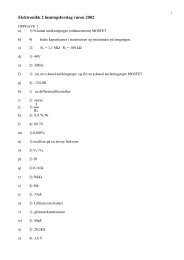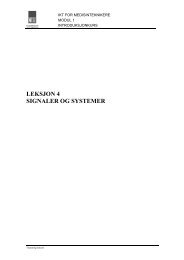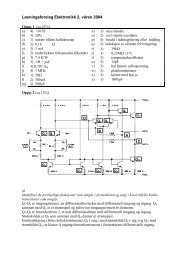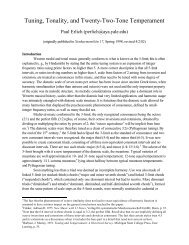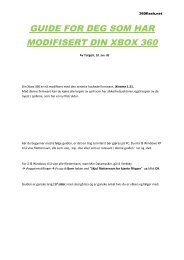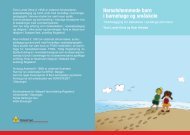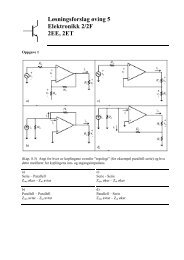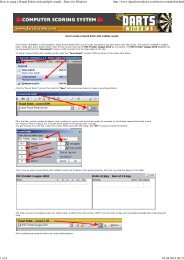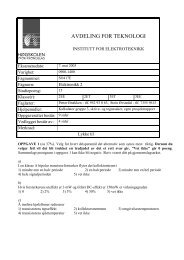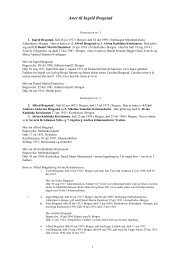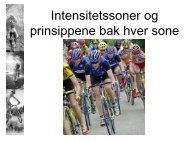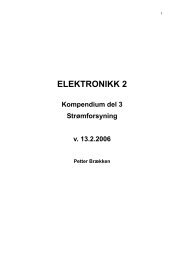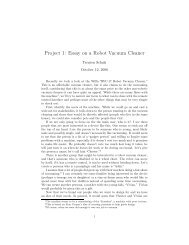The Online World resources handbook
The Online World resources handbook
The Online World resources handbook
Create successful ePaper yourself
Turn your PDF publications into a flip-book with our unique Google optimized e-Paper software.
Getting started http://home.eunet.no/~presno/bok/v2.html<br />
??<br />
112<br />
Kbits/sec<br />
Boca Research Inc. was the first to<br />
announce such a modem (November<br />
1997).<br />
:KHQ \RX FRQVLGHU EX\LQJ D PRGHP ZLWK KLJKHU VSHHG UHPHPEHU WKDW JRLQJ IURP<br />
ESV WR LV D SHUFHQW LQFUHDVH ZKLOH JRLQJ IURP WR ESV JLYHV<br />
percent!<br />
If you now have 9600 bits/s, going to 28.800 will potentially triple the speed.<br />
MNP error correction and compression<br />
<strong>The</strong> Microcom Networking Protocol (MNP) is a U.S. industry standard for modem<br />
to modem communication with automatic error correction and compression.<br />
Automatic error correction is useful when there is noise on the telephone line.<br />
MNP splits the stream of data up into blocks before transmission. <strong>The</strong>y are checked by<br />
the other modem upon receipt. If the contents are correct, an acknowledging message is<br />
sent back to the sending modem. If there is an error in the transmission, the sending<br />
modem is asked to retransmit.<br />
When using compression, files are being preprocessed before transmission to<br />
decrease their size. <strong>The</strong> result is that the modem has to send fewer bytes, and the effect<br />
is higher speed.<br />
MNP Level 3 and up send data between two modems synchronously rather than<br />
asynchronously. Since sending a start and stop bit with each transferred byte is no longer<br />
required, the effect is higher speed.<br />
MNP 4 or higher have automatic adjustment of block length when there is noise on<br />
the line. If the line is good, longer blocks are sent. <strong>The</strong> block size is decreased if the line<br />
is bad causing many retransmissions.<br />
MNP 5 has data compression. This gives a further increase in transfer speed by<br />
from 10 to 80 percent depending on the type of data sent. MNP 7 is capable of a three<br />
to one compression ratio.<br />
Both users must have their modems set for MNP to use it.<br />
<strong>The</strong> speed of your computer's COMM port<br />
Installing a super fast modem does not guarantee an increase in the effective transfer<br />
speed. <strong>The</strong> serial port of your computer may be a limiting factor.<br />
Owners of older MS DOS computers often have UARTs (serial port processors) in<br />
the Intel 8250 or National 16450 series. With these in the computer, it is difficult to<br />
achieve speeds above 9600 bps without losing data.<br />
Take this into account when investing in a modem.<br />
MNP and efficiency<br />
I call the Internet daily. My personal computer is set to communicate with a 28.800 bps<br />
modem at 57.600 bps. <strong>The</strong> modem sends data to the telephone line at 28.800 bps, this<br />
modem's maximum line speed.<br />
Data is received by the remote computer's 28.800 bps modem at 28.800 bps, and<br />
probably forwarded to the Internet server at an unknown higher speed.<br />
Why these differences in speed?<br />
MNP level 5 compresses data in the modem before transfer, and gives error free<br />
transfer to and from the Internet server at higher speed than by using 28.800 bps all the<br />
way through.<br />
<strong>The</strong> compression effectiveness differs by the type of data. When sending text, the<br />
effective transfer speed may double. Speed will increase further if the text contains long<br />
sequences of similar characters.<br />
Text is typically compressed by up to 63 percent. This means that a 2400 bps<br />
modem using MNP 5 may get an effective speed of around the double when transferring<br />
such data.<br />
4 of 9 23.11.2009 15:50



